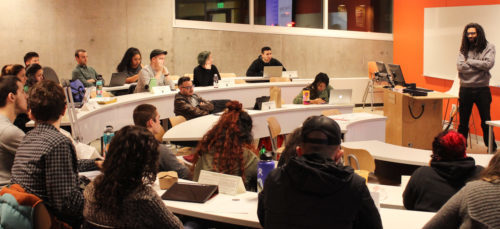President Donald Trump announced the United States’ departure from the Joint Comprehensive Plan of Action, or Iran Nuclear Deal, on Tuesday, May 7, saying the deal “should have never been made.” A Portland State Middle Eastern studies expert said he believes Trump’s decision symbolizes a fundamental misunderstanding of Iran’s cultural, religious and economic positions.
Amid an outcry of opposition from other parties committed to the JCPOA, Trump defended his decision, saying, “at the heart of the Iran deal was a giant fiction that a murderous regime desired only a peaceful nuclear energy program.” Trump also vowed to implement “the highest level of economic sanctions” against Iran and insinuated any country who continued to support Iran could also face sanctions. This measure is a key part of what Trump stated to be a new U.S.–fronted effort to find a “real, comprehensive and lasting solution to the Iranian nuclear threat.”
The JCPOA is an agreement made in 2015 between Iran and the P5+1 World powers—which include the U.S., the UK, France, China, Russia and Germany—requiring Iran to limit its nuclear ambitions to nuclear energy production while allowing routine inspections by the International Atomic Energy Agency in order to assure the country’s ongoing compliance. Leading up to Trump’s decision to withdraw the U.S., Iran had been in compliance with the JCPOA, according to the IAEA and several international watchdog organizations.
Dr. Robert Asaadi, adjunct professor of international and global studies at PSU and faculty member of the Middle East Studies Center, said he believes the concern over an Iranian nuclear threat shows a misunderstanding of Iranian motives for nuclear development in the first place.
Asaadi explained Iran has publicly maintained its pursuit of nuclear technology is solely for nuclear energy. “There’s a misconception that Iran is awash in oil, so it must have all its energy needs met,” Asaadi said. “Well, they still have a huge problem with refining oil to actually use it. They want to develop nuclear energy as an alternative to that.”
According to the fourth article of the Non-Proliferation Treaty—a measure presented by the UN in 1968 to promote global cooperation in pursuit of peaceful nuclear energy use and eventual nuclear disarmament—any signatory of the NPT has the right to pursue nuclear energy technology so long as it does not also pursue its weaponization. According to the Middle Eastern and Islamic studies journal Insight Turkey, Iran remains a signatory of the NTP in compliance with its regulations.
Asaadi also said the religious aspect of nuclear weaponization is significant in Iran’s case, where 90 percent of the population adheres to Shia Islam. “The supreme leader of Iran, Ali Khamenei, who is the highest religious authority for Iranian Shiites, has said that the production, stockpiling and use of nuclear weapons is antithetical to Islam,” Asaadi explained.
Asaadi added that the Trump administration’s tactic of employing economic sanctions in order to bring Iran back to the bargaining table will likely backfire, due largely to what Asaadi sees as Trump’s misunderstanding of Iran’s culture. “There is this idea of putting pressure on someone in order to get them to come to your side…which I think is Trump’s view,” Asaadi said. “He’s a businessman. The idea is that you gain leverage, exploit a position of weakness, and you get the person you’re negotiating with to come to your terms. [That is] not a universal human trait. In different cultures, if you put pressure on someone, you may in fact get them to just double down and become more intransigent.”
Asaadi said he believes what is really at stake with the possible continuation of the JCPOA—an outcome that has been acknowledged by Iran and other countries that are still involved in the deal—is the potential for Iran’s people to see meaningful reform within the government in the near future. “I think that, within the deal, there can be negotiations or some effort to normalize relations with Iran,” Asaadi said. “The more that that can happen, the better it is for the prospect of reforming the country.”
I am a Senior in the Applied Linguistics Bachelor of Arts program at PSU. I currently work as a linguistic grader with WeLocalize, an international localization firm. I am excited to start Vanguard’s brand new sports section, and I hope to cultivate it in a manner that best serves and represents PSU’s various student athletes. When I am not at work or at school, I spend my time obsessing over the Portland Trail Blazers—and the NBA in general—with my wife, Maggie.






